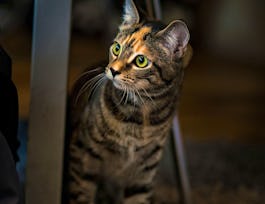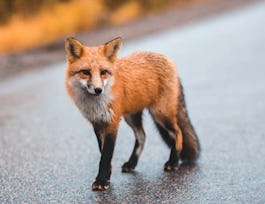This course explores animals within the context of the functional relationships that sociologists call “institutions.” We first examine the use of animals in laboratory science. We then examine the controversial transformation of animals into “livestock” and "meat." We also explore the perspectives of people committed to rejecting the construction and use of animals as food. Next, we focus on some of the roles of animals in human entertainment with particular attention to dog fighting and zoos. Finally, we investigate animal health and welfare through the lens of dilemmas in veterinary medicine and decisions in animal shelters.


Animals and Institutions
This course is part of Animals and Society Specialization
Taught in English
Some content may not be translated

Instructor: Leslie Irvine
2,923 already enrolled
Included with 
Course
(54 reviews)
What you'll learn
Describe the status of animals used in research.
Identify the trends that led to modern industrial livestock production in the United States.
Determine the most appropriate roles of zoos in modern societies.
Identify dilemmas faced by veterinarians and animal shelter workers.
Skills you'll gain
Details to know

Add to your LinkedIn profile
2 quizzes
Course
(54 reviews)
See how employees at top companies are mastering in-demand skills

Build your subject-matter expertise
- Learn new concepts from industry experts
- Gain a foundational understanding of a subject or tool
- Develop job-relevant skills with hands-on projects
- Earn a shareable career certificate


Earn a career certificate
Add this credential to your LinkedIn profile, resume, or CV
Share it on social media and in your performance review

There are 4 modules in this course
In this module, you will gain familiarity with the issues that shape the use of animals in scientific research and underlie the controversy surrounding it.
What's included
4 videos1 reading1 quiz2 discussion prompts
In this module, you will learn about the system through which animals are transformed into “livestock.”
What's included
3 videos1 discussion prompt
In this module, you will investigate how animals are central to how humans spend their leisure time.
What's included
4 videos1 quiz1 discussion prompt
In this module, you will examine the social worlds of veterinary medicine and animal sheltering.
What's included
4 videos1 reading1 peer review2 discussion prompts
Instructor

Offered by
Recommended if you're interested in Governance and Society

University of Colorado Boulder

University of Colorado Boulder

University of Colorado Boulder

The University of Edinburgh
Why people choose Coursera for their career




Learner reviews
Showing 3 of 54
54 reviews
- 5 stars
87.03%
- 4 stars
9.25%
- 3 stars
1.85%
- 2 stars
0%
- 1 star
1.85%

Open new doors with Coursera Plus
Unlimited access to 7,000+ world-class courses, hands-on projects, and job-ready certificate programs - all included in your subscription
Advance your career with an online degree
Earn a degree from world-class universities - 100% online
Join over 3,400 global companies that choose Coursera for Business
Upskill your employees to excel in the digital economy
Frequently asked questions
Access to lectures and assignments depends on your type of enrollment. If you take a course in audit mode, you will be able to see most course materials for free. To access graded assignments and to earn a Certificate, you will need to purchase the Certificate experience, during or after your audit. If you don't see the audit option:
The course may not offer an audit option. You can try a Free Trial instead, or apply for Financial Aid.
The course may offer 'Full Course, No Certificate' instead. This option lets you see all course materials, submit required assessments, and get a final grade. This also means that you will not be able to purchase a Certificate experience.
When you enroll in the course, you get access to all of the courses in the Specialization, and you earn a certificate when you complete the work. Your electronic Certificate will be added to your Accomplishments page - from there, you can print your Certificate or add it to your LinkedIn profile. If you only want to read and view the course content, you can audit the course for free.
If you subscribed, you get a 7-day free trial during which you can cancel at no penalty. After that, we don’t give refunds, but you can cancel your subscription at any time. See our full refund policy.

